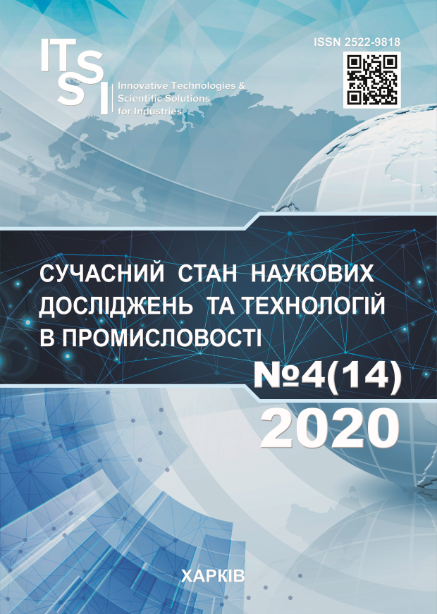MODERN APPROACHES FOR INTEGRATED REPORTING PREPARING IN UKRAINE
DOI:
https://doi.org/10.30837/ITSSI.2020.14.121Keywords:
integrated reporting, management report, financial reporting, social reporting, non-financial indicatorsAbstract
In modern conditions, the possibilities of Accounting Reporting do not meet the tasks of contentment the information needs of users of accounting data, which are aimed at obtaining evidence of the stable and sustainable functioning of both the business entity and the region where it operates, and the state as a whole. The subject of the article is the different approaches to the preparation of integrated reporting and features of the formation of indicators. Integrated corporate reporting defines a single format for providing interested consumers with information about the company's activities, risks and potential for quality services, covers financial and non-financial reporting and discloses the effectiveness of economic, environmental and social activities of the company, ensuring transparency of information on business risks and management. At present, enterprises in Ukraine compile a report that combines financial indicators and indicators that characterize some important social aspects – Management Report. The paper considers the concept of cost reporting, the key idea of which is to achieve greater informativeness of accounting indicators through corporate reporting and the development of standards of non-financial information that reflects the industry specifics of the enterprise. The purpose of the work is a detailed consideration of the essence of integrated reporting, problems of its compilation, analysis of existing approaches to the formation of indicators of integrated reporting of different companies taking into account the needs of users, justification of indicators included in integrated reporting. The study used a set of methods and approaches, such as dialectical, synthesis and comparative, systemic. The article solves such tasks as analysis of functions and components of integrated reporting, analysis of the Management Report and indicators that form it, determining the features of its preparation by different companies, the basic principles of integrated reporting in accordance with the international standard of integrated reporting. The obtained results are a detailed analysis of the indicators of the management report and the introduction of prerequisites for the effective formation of such indicators. Conclusions: Further development of integrated reporting should focus on such important aspects as the development of a system of financial and non-financial indicators, methods of obtaining information, generalization of various management systems (management accounting, monitoring, analysis of financial stability) in the preparation of internal integrated reporting.
References
Bezverkhy, K. V. (2017), "Approaches to Determining the Purpose of Integrated Reporting", Problems of Accounting and Analytical Support of Business Management: Materials of the II All-Ukrainian Scientific-practical Conference, October 26, 2017, Poltava. P. 94–96.
Gnylytska, L. V. (2016), "Modern Approaches to the Quintessence of Public Reporting of the Enterprise in the Context of Ensuring its Economic Security", Problems of Theory and Methodology of Accounting, Control and Analysis. Ser.: Accounting, Control and Analysis, Vol. 1, P. 48–65.
Kostyrko, R. O., Prozorov, D. V. (2017), "Integrated Corporate Reporting - a Tool for Sustainable Development of Enterprises", Bulletin of the Volodymyr Dahl East Ukrainian National University, No. 2 (232), P. 44–49.
Karpushenko, M. (2018), "Social Reporting as an Indicator of the Enterprise Development", Innovative Technologies and Scientific Solutions for Industries, No. 1 (3), P. 91–95.
Karpushenko, M., Shakhverdyan, D. (2019), "Integrated Reporting as a Source of Assessment of Enterprise Activity", Business Inform, No. 3, P. 265–269.
Kuzina, R. (2016), Formation of the System of Corporate Reporting: theory, methodology and organization: dis. ... Dr. econ. Sciences: 08.00.09 "Accounting, analysis and audit", Odessa, 591 p.
Shigun, M., Davydyuk, T. (2011), "Corporate Social Reporting as a Prospect of Informing about Human Capital of Domestic Companies", Bulletin of the Zaporizhia National University, No. 1 (9), P. 173–179.
Serafeim, G. (2015), "Іntegrated Reporting and Investor Clientele", Journal of Applied Corporate Finance, No. 27.2, Р. 34–51.
Robert, G. (2013), "One Report: Integrated Reporting for a Sustainable Strategy", Р. 115–121.
Ioana, D., Adriana, T. (2014), "Research Agenda on Integrated Reporting: New Emergent", Theory and Practice Procedia Economics and Finance, Vol. 15, P. 221–227.
Adams, C. A. (2015), "The International Integrated Reporting Council: a Call to Action", Critical Perspectives on Accounting, Р. 23–28.
Lee, K. (2016), "The Association Between Integrated Reporting and Firm Valuation", Review of Quantitative Finance and Accounting, No. 47, Р. 1221–1250.
Martin, K. (2014), "The Potential Impact of COSO Internal Control Integrated Framework Revision on Internal Audit Structured SOX Work Programs", Research in Accounting Regulation, No. 26, Р. 110–117.
"Sustainability Reporting Guide", available at : https://www.globalreporting.org/resourcelibrary/Russian-G4-Part-One.pdf
"International Standard for Integrated Reporting", available at : http://edu.inesnet.ru/wp-content/uploads/2014/05/13-12-08-THE-INTERNATIONAL-IR-FRAMEWORK.docx_ en-US_ru-RU.pdf
"Methodical recommendations for compiling a management report", available at : https://zakon.rada.gov.ua/rada/show/v0982201-18#Text.
Downloads
Published
How to Cite
Issue
Section
License
Copyright (c) 2020 Tetiana Momot, Maria Maria, Tang Linlin

This work is licensed under a Creative Commons Attribution-NonCommercial-ShareAlike 4.0 International License.
Our journal abides by the Creative Commons copyright rights and permissions for open access journals.
Authors who publish with this journal agree to the following terms:
Authors hold the copyright without restrictions and grant the journal right of first publication with the work simultaneously licensed under a Creative Commons Attribution-NonCommercial-ShareAlike 4.0 International License (CC BY-NC-SA 4.0) that allows others to share the work with an acknowledgment of the work's authorship and initial publication in this journal.
Authors are able to enter into separate, additional contractual arrangements for the non-commercial and non-exclusive distribution of the journal's published version of the work (e.g., post it to an institutional repository or publish it in a book), with an acknowledgment of its initial publication in this journal.
Authors are permitted and encouraged to post their published work online (e.g., in institutional repositories or on their website) as it can lead to productive exchanges, as well as earlier and greater citation of published work.














